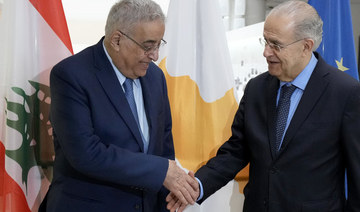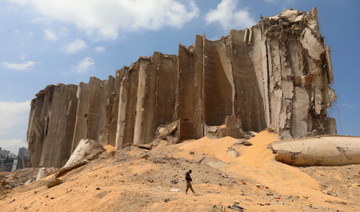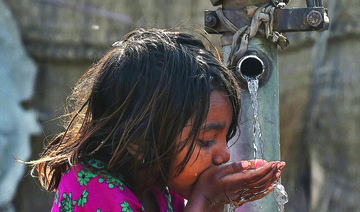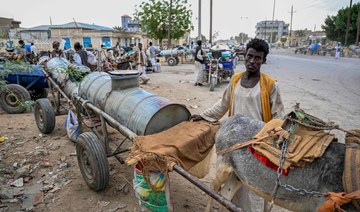BEIRUT: Protests were held in Beirut on Tuesday against a draft capital control law, even as parliamentary committees discussed the proposed legislation.
Formal capital controls are an International Monetary Fund policy recommendation, and Lebanon hopes to secure an IMF aid package after the country’s financial system imploded in 2019, paralyzing the banking system and freezing depositors out of their US dollar accounts.
Depositors gathered in the vicinity of parliament to prevent MPs from attending the session. Members of the Free Professions Syndicates also held sit-ins at their headquarters in protest against the draft law.
They said it was unjust on depositors who they believed were being forced to bear the consequences of the country’s economic crisis and corruption.
Nader Kaspar, head of the Beirut Bar Association, said: “One of the most immoral issues in Lebanon is depositors’ money. It is a national, humanitarian, and social issue par excellence. We lost our entire life savings and now, after over two years, they want to talk about capital control.
“The banks did not shut down, and the owners still have their private jets and luxurious villas. Now they want to talk about distributing losses without any concrete plans?
“We will escalate our action. A strike is not enough. There is a constitution that must be respected and we will not accept laws that legitimize taking over people’s money.”
The Federation of Syndicates of Bank Employees in Lebanon said: “Touching depositors’ money is forbidden. The federation will join in every action to confront those trying to take over people’s money.”
The Lebanese Press Editors Syndicate also objected to the attempt to pass a capital control bill, along with the continued restrictions on union deposits and funds, and banking restrictions.
Syndicate head Joseph Kossaifi said: “The unions have deposits in banks and there are mutual funds that deposit large sums in banks, which are subscriptions and donations to ensure people’s pensions. Does this mean that the money of about a million people has evaporated?”
In a letter to Prime Minister Najib Mikati, the Association of Banks in Lebanon said: “The IMF’s proposal to make banks bear the losses is unfair, just as the proposal to charge a large part of these losses to depositors means exempting the state and the Banque du Liban from debt and losses.
“If this were to happen, banks, shareholders, and depositors would file lawsuits against the state and BDL, which benefited from the funds of the banks and depositors and still refuse to find satisfactory solutions to solve the issue.”
Mikati told an ABL delegation on Tuesday: “One of the government’s priorities in the economic process is to preserve the rights of depositors. The recovery plan gives priority to preserving people’s rights, reactivating the various productive sectors, and preserving the banking sector.”
With the government insisting on its amendments to the draft law and demanding that parliament approve it quickly having signed a staff-level agreement with the IMF, the head of the Administration and Justice Committee, MP George Adwan, said after the parliamentary committee meetings: “The government did not present any recovery plan. We have removed some articles of the draft so no one can say that parliament does not want the Capital Control Law.”
Adwan added that Mikati’s claims about not wasting people’s deposits were “mere words without any concrete action.”
Meanwhile, pharmacies across Lebanon closed on Tuesday in protest against the country’s security turmoil and the killing of a pharmacist at her workplace on Monday in the town of Mrouj in Mount Lebanon.
Leila Rizk was found dead in the pharmacy toilet on Monday evening.
Rizk, a mother of three, had been working as a pharmacist for 20 years.
Joe Salloum, head of the Pharmacists Syndicate, condemned the crime and demanded that the security forces protect pharmacies in light of the “ongoing security chaos.”
While the preliminary investigation did not reveal the reasons for the crime, information suggested that the crime was not about stealing money or drugs.
President Michel Aoun called Salloum and assured him that instructions had been given to the security services to “pursue and arrest” the perpetrators.
On Tuesday, Aoun met Lebanon’s ambassador to Saudi Arabia Fawzi Kabbara before he left for the Kingdom. Saudi Arabia’s ambassador to Lebanon, Walid Bukhari, returned to Beirut last week.
“The president’s directives have always been to ensure the best relations between Lebanon and the brotherly Arab countries in general, and the Gulf states in particular, especially Saudi Arabia,” Kabbara said.
Protests held in Beirut against draft capital control law
https://arab.news/cnkrv
Protests held in Beirut against draft capital control law

- Formal capital controls are an International Monetary Fund policy recommendation
- Depositors gathered in the vicinity of parliament to prevent MPs from attending the session
Afghan Taliban government says to attend third round of UN-hosted Doha talks

- Mujahid told local media on Sunday the decision had been made to send a delegation, the members of which would be announced later, because it was deemed “beneficial to Afghanistan”
KABUL: Taliban authorities will attend the third round of United Nations-hosted talks on Afghanistan in the Qatari capital, a government spokesman told AFP on Sunday, after snubbing an invitation to the previous round.
“A delegation of the Islamic Emirate will participate in the coming Doha conference. They will represent Afghanistan there and express Afghanistan’s position,” Taliban government spokesman Zabihullah Mujahid said of the talks, which are scheduled to start June 30.
The participation of the Taliban authorities in the two-day conference of special envoys on Afghanistan had been in doubt after they were not included in the first round and then refused an invitation to the second round in February.
Mujahid told local media on Sunday the decision had been made to send a delegation, the members of which would be announced later, because it was deemed “beneficial to Afghanistan”.
Hamas response to Gaza ceasefire proposal ‘consistent’ with principles of US plan, leader says

- Egypt and Qatar said on June 11 that they had received a response from the Palestinian groups to the US plan
CAIRO: Hamas’ response to the latest Gaza ceasefire proposal is consistent with the principles put forward in US President Joe Biden’s plan, the group’s Qatar-based leader Ismail Haniyeh said in a televised speech on the occasion of the Islamic Eid Al-Adha on Sunday.
“Hamas and the (Palestinian) groups are ready for a comprehensive deal which entails a ceasefire, withdrawal from the strip, the reconstruction of what was destroyed and a comprehensive swap deal,” Haniyeh said, referring to the exchange of Israeli hostages for Palestinian prisoners.
On May 31, Biden laid out what he called a “three-phase” Israeli proposal that would include negotiations for a permanent ceasefire in Gaza as well as phased exchanges of Israeli hostages for Palestinian prisoners held in Israel.
Egypt and Qatar — which along with the United States have been mediating between Hamas and Israel — said on June 11 that they had received a response from the Palestinian groups to the US plan, without giving further details.
While Israel said Hamas rejected key elements of the US plan, a senior Hamas leader said that the changes the group requested were “not significant”.
Red Sea crisis intensifies economic strain on Yemenis ahead of Eid

- Sales have decreased by 80 percent
- Over 1.2 million civil servants have not received salaries in eight years, and hundreds of thousands have lost their jobs
DUBAI: Yemen, suffering from nearly a decade of civil war, now faces an additional challenge: a crippled economy further strained by the escalating crisis in the Red Sea.
Market vendors in Sanaa’s Old City, the Al-Melh, claim that sales have decreased by 80 percent, according to a report by Chinese news agency Xinhua.
Shopkeepers attribute this decline to recent increases in sea shipping costs, which have driven up wholesale prices.
This situation reflects the broader economic crisis in Yemen, where rising sea shipping costs have increased prices across the board, making basic Eid essentials unaffordable for many.
To help ease financial strain, an exhibition was organized in Al-Sabeen Park, where families were able to sell homemade goods.
Despite these efforts, Yemen’s economic problems persist. According to the UN, the decade-long war has pushed millions into poverty. Over 1.2 million civil servants have not received salaries in eight years, and hundreds of thousands have lost their jobs. The Norwegian Refugee Council reports that four out of five Yemenis face poverty, and over 18 million people urgently need humanitarian aid.
Water crisis batters war-torn Sudan as temperatures soar

- The country at large, despite its many water sources including the mighty Nile River, is no stranger to water scarcity
- This summer, the mercury is expected to continue rising until the rainy season hits in August
PORT SUDAN, Sudan: War, climate change and man-made shortages have brought Sudan — a nation already facing a litany of horrors — to the shores of a water crisis.
“Since the war began, two of my children have walked 14 kilometers (nine miles) every day to get water for the family,” Issa, a father of seven, said from North Darfur state.
In the blistering sun, as temperatures climb past 40 degrees Celsius (104 degrees Fahrenheit), Issa’s family — along with 65,000 other residents of the Sortoni displacement camp — suffer the weight of the war between Sudan’s army and the paramilitary Rapid Support Forces (RSF).
When the first shots rang out more than a year ago, most foreign aid groups — including the one operating Sortoni’s local water station — could no longer operate. Residents were left to fend for themselves.
The country at large, despite its many water sources including the mighty Nile River, is no stranger to water scarcity.
Even before the war, a quarter of the population had to walk more than 50 minutes to fetch water, according to the United Nations.
Now, from the western deserts of Darfur, through the fertile Nile Valley and all the way to the Red Sea coast, a water crisis has hit 48 million war-weary Sudanese who the US ambassador to the United Nations on Friday said are already facing “the largest humanitarian crisis on the face of the planet.”
Around 110 kilometers east of Sortoni, deadly clashes in North Darfur’s capital of El-Fasher, besieged by RSF, threaten water access for more than 800,000 civilians.
Medical charity Doctors Without Borders (MSF) on Friday said fighting in El-Fasher had killed at least 226.
Just outside the city, fighting over the Golo water reservoir “risks cutting off safe and adequate water for about 270,000 people,” the UN children’s agency UNICEF has warned.
Access to water and other scarce resources has long been a source of conflict in Sudan.
The UN Security Council on Thursday demanded that the siege of El-Fasher end.
If it goes on, hundreds of thousands more people who rely on the area’s groundwater will go without.
“The water is there, but it’s more than 60 meters (66 yards) deep, deeper than a hand-pump can go,” according to a European diplomat with years of experience in Sudan’s water sector.
“If the RSF doesn’t allow fuel to go in, the water stations will stop working,” he said, requesting anonymity because the diplomat was not authorized to speak to media.
“For a large part of the population, there will simply be no water.”
Already in the nearby village of Shaqra, where 40,000 people have sought shelter, “people stand in lines 300 meters long to get drinking water,” said Adam Rijal, spokesperson for the civilian-led General Coordination for Displaced Persons and Refugees in Darfur.
In photos he sent to AFP, some women and children can be seen huddled under the shade of lonely acacia trees, while most swelter in the blazing sun, waiting their turn.
Sudan is hard-hit by climate change, and “you see it most clearly in the increase in temperature and rainfall intensity,” the diplomat said.
This summer, the mercury is expected to continue rising until the rainy season hits in August, bringing with it torrential floods that kill dozens every year.
The capital Khartoum sits at the legendary meeting point of the Blue Nile and White Nile rivers — yet its people are parched.
The Soba water station, which supplies water to much of the capital, “has been out of service since the war began,” said a volunteer from the local resistance committee, one of hundreds of grassroots groups coordinating wartime aid.
People have since been buying untreated “water off of animal-drawn carts, which they can hardly afford and exposes them to diseases,” he said, requesting anonymity for fear of reprisal.
Entire neighborhoods of Khartoum North “have gone without drinking water for a year,” another local volunteer said, requesting to be identified only by his first name, Salah.
“People wanted to stay in their homes, even through the fighting, but they couldn’t last without water,” Salah said.
Hundreds of thousands have fled the fighting eastward, many to the de facto capital of Port Sudan on the Red Sea — itself facing a “huge water issue” that will only get “worse in the summer months,” resident Al-Sadek Hussein worries.
The city depends on only one inadequate reservoir for its water supply.
Here, too, citizens rely on horse- and donkey-drawn carts to deliver water, using “tools that need to be monitored and controlled to prevent contamination,” public health expert Taha Taher said.
“But with all the displacement, of course this doesn’t happen,” he said.
Between April 2023 and March 2024, the health ministry recorded nearly 11,000 cases of cholera — a disease endemic to Sudan, “but not like this” when it has become “year-round,” the European diplomat said.
The outbreak comes with the majority of Sudan’s hospitals shut down and the United States warning on Friday that a famine of historic global proportions could unfold without urgent action.
“Health care has collapsed, people are drinking dirty water, they are hungry and will get hungrier, which will kill many, many more,” the diplomat said.
UAE, Iran discuss bilateral relations

DUBAI: The United Arab Emirats Minister of Foreign Affairs, Sheikh Abdullah bin Zayed, had a phone conversation on Saturday with Iran's acting Minister of Foreign Affairs, Ali Bagheri Kani, to discuss the bilateral relations between the two countries.
During the call, they exchanged Eid Al-Adha greetings and explored ways to enhance cooperation that would serve the mutual interests of their countries and peoples, contributing to regional security and stability.
They also reviewed several issues of common interest, as well as recent developments in both regional and international arenas.


















